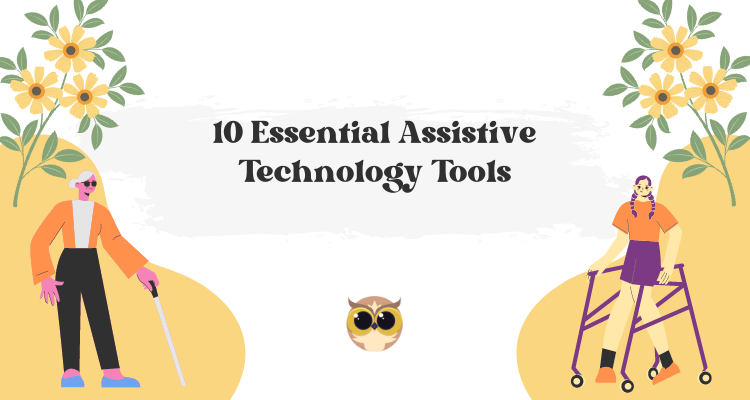10 Essential assistive technology tools for web accessibility

In today's digital age, web accessibility is of paramount importance. It ensures that individuals with disabilities can navigate websites and online content with ease, providing equal access to information and services. One of the key ways to enhance web accessibility is through the use of assistive technology tools. These tools empower individuals with disabilities to overcome barriers and interact with digital platforms more effectively. In this blog post, we will explore ten essential assistive technology tools, including Helperbird, a comprehensive accessibility solution that significantly improves web accessibility.
1. Screen Readers
Screen readers are vital assistive technology tools for individuals with visual impairments. They convert on-screen text into synthesized speech or braille output, enabling users to hear or read the content. Popular screen readers include JAWS, NVDA (NonVisual Desktop Access), and VoiceOver (for macOS and iOS devices). Helperbird provides additional features and customization options, making it a valuable companion for screen reader users.
2. Magnification Tools
Magnification tools help users with low vision by enlarging on-screen content. These tools allow individuals to adjust the size of text, images, and other elements to suit their visual needs. Examples include ZoomText, Windows Magnifier, and macOS Zoom. Helperbird offers magnification features that enhance the usability of websites for users with low vision.
3. Color Contrast Analyzers
Color contrast analyzers assist in ensuring sufficient contrast between text and background colors. They help identify accessibility issues related to readability for individuals with visual impairments or color blindness. Tools like WebAIM's Contrast Checker and Color Contrast Analyzer help web designers assess and improve color contrast to meet accessibility guidelines. Helperbird allows users to customize color contrast settings, providing a personalized viewing experience.
4. Alternative Text (Alt Text) Generators
Alternative text, or alt text, is used to describe images for users who cannot see them. Alt text generators automatically generate descriptive text for images based on their content. This helps individuals using screen readers or those with visual impairments to understand the context of the image. Plugins like Yoast SEO and Alt Text Tools can facilitate the creation of alt text for images on websites. Helperbird can automatically generate and manage alt text for images, saving time and effort for content creators.
5. Captioning and Transcription Tools
Captioning and transcription tools are crucial for making audio and video content accessible to individuals with hearing impairments. These tools automatically generate captions or transcriptions for multimedia content, allowing users to follow along. Services like YouTube's automatic captioning or third-party transcription tools like Rev or 3Play Media can enhance accessibility for deaf or hard-of-hearing users. Helperbird offers built-in captioning features that ensure multimedia content is accessible and inclusive.
6. Keyboard Navigation Enhancements
Keyboard navigation is essential for individuals with motor disabilities who rely on keyboards or alternative input devices. Web developers can implement keyboard navigation enhancements such as skip links, focus indicators, and logical tab order to ensure smooth navigation without requiring a mouse. Helperbird improves keyboard accessibility by providing shortcuts and optimizing navigation for users who prefer keyboard-based interactions.
7. Readability Tools
Readability tools help enhance the legibility of web content, benefiting users with cognitive or learning disabilities. These tools simplify complex text, adjust font styles, and provide customizable reading experiences. Browser extensions like Readability, BeeLine Reader, or Helperbird can make text more accessible and easier to comprehend. Helperbird offers customizable font styles, text spacing, and background colors, improving readability for all users.
8. Speech Recognition Software
Speech recognition software allows users to interact with websites and applications using their voice. This technology is particularly beneficial for individuals with mobility impairments or those who prefer voice commands. Popular examples include Dragon NaturallySpeaking, Google Assistant, or Apple's Siri. Helperbird integrates with speech recognition software, enabling hands-free browsing and interaction.
9. Braille Displays
Braille displays convert on-screen content into tactile braille output, enabling individuals with visual impairments to read digital information. These devices feature a series of raised pins that dynamically change to represent text. Web developers can optimize their websites to be compatible with braille displays, ensuring that braille readers can access their content effectively. Helperbird supports braille displays, providing a seamless reading experience for braille users.
10. Accessibility Evaluation Tools
Accessibility evaluation tools help assess and identify potential accessibility issues on websites. These tools scan web pages and generate reports with recommendations for improvements. Popular options include WebAIM's WAVE, Axe by Deque, and Google Lighthouse. By regularly evaluating and addressing accessibility concerns, websites can provide a more inclusive online experience. Helperbird can be used in conjunction with these tools to address accessibility issues and ensure compliance with accessibility standards.
Incorporating these essential assistive technology tools, including Helperbird, a comprehensive accessibility solution, is crucial for achieving web accessibility and ensuring equal access to digital content. By implementing these tools and following inclusive design principles, websites can create a more inclusive and accessible online experience for all users.
